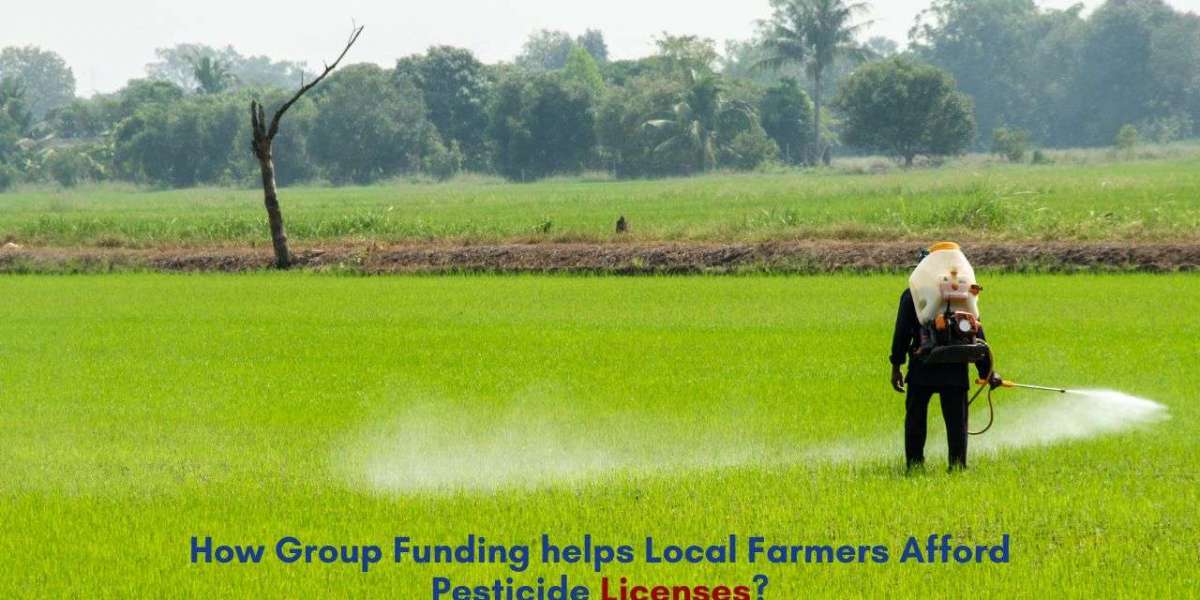Introduction
Securing a pesticide license is a vital step for local farmers looking to use approved pesticides for effective crop protection and to sell these products legally. However, the cost and regulatory barriers associated with obtaining such licenses can pose significant challenges, particularly for small-scale farmers with limited financial resources. Group funding has emerged as an effective solution, empowering farmers to collectively raise the capital required to meet pesticide licensing requirements. This model not only alleviates financial strain but also fosters a collaborative community, enabling farmers to sustain their livelihoods and enhance productivity.
The Importance of a Pesticide License for Farmers
A pesticide license allows farmers to purchase, handle, and apply specific pesticides that are legally regulated to ensure safety and environmental protection. The licensing process, managed by regulatory bodies, involves several steps, including training on safe pesticide application and assessments of the farmer’s knowledge and skill level. For many small farmers, the application costs and the time spent on the certification process can be daunting, making it financially challenging to access the necessary licenses. This situation becomes even more complex when it comes to obtaining a pesticides shop licence qualification, which involves additional costs and requirements for those wishing to sell pesticides locally.
Group Funding: A Solution to Financial Barriers
Group funding provides a cooperative solution where farmers pool resources to meet their collective needs. This approach involves several individuals or groups contributing funds to help others within the group obtain their pesticide license. By participating in group funding initiatives, farmers can distribute the costs associated with the licensing process, making it more manageable and attainable for everyone involved.
Fundraising for business purposes, such as obtaining licenses, is often conducted through community-based organizations, cooperatives, or digital platforms that enable community members to contribute to a shared fund. These platforms help streamline the process, allowing farmers to track contributions, set funding targets, and allocate resources effectively. This model has become increasingly popular as it provides an accessible way for farmers to overcome financial constraints and invest in tools that enhance their agricultural practices.
How Group Funding Reduces the Cost of a Pesticides Shop Licence Qualification
In many areas, obtaining a pesticides shop licence qualification is necessary for farmers who want to sell pesticides or operate a small agricultural supply business. The qualification typically requires both knowledge and an investment in inventory, record-keeping, and secure storage for hazardous materials. Through group funding, farmers can collectively meet the requirements of this qualification by pooling resources for training sessions, inventory purchasing, and compliance with safety standards.
Group funding initiatives may also include access to professional advisory services, which can guide farmers through the licensing process, helping them understand the legal aspects and specific requirements of pesticide licensing. By sharing these services, farmers are better equipped to manage the regulatory aspects involved in obtaining a pesticides shop license, ultimately leading to more affordable and streamlined access to these essential resources.
Role of Business Advisory Services in Group Funding Initiatives
Business advisory services play a crucial role in helping farmers and agricultural groups develop effective group funding strategies. These services offer expertise in structuring group funding efforts to meet specific licensing costs, organize fundraising for business purposes, and advise on optimal ways to manage and allocate raised funds. Business advisors can also help farmers create a clear roadmap, guiding them through the different stages of the pesticide licensing process and ensuring compliance with regulatory standards.
Professional advisors can help farmers navigate various licensing agreement laws, ensuring they understand their obligations under local and national regulations. For example, by clarifying the specific requirements for pesticide licenses, advisory services can prevent common compliance issues and facilitate smoother licensing approvals. Access to sound business advice also supports long-term planning, allowing farmers to budget for future licensing renewals and necessary certifications, creating a sustainable framework for their agricultural operations.
The Legal Aspects: Understanding License Agreements in Agriculture
A license agreement is a formal arrangement that grants the license holder the legal right to use or sell certain products or services. In the context of pesticide licenses, farmers must adhere to the licensing agreement law, which defines the terms and conditions under which they can legally operate. These agreements are essential for ensuring that farmers and pesticide sellers operate within the regulatory framework established to protect consumers, the environment, and agricultural professionals.
Different types of licensing agreements may be relevant to farmers, depending on their operations and the scope of their licensing needs. Some farmers may only need a license to purchase and apply pesticides on their own crops, while others may require a broader license to sell pesticides in their community. Each type of licensing agreement has its specific requirements and costs, which can be effectively addressed through group funding initiatives. Understanding these agreements and adhering to legal standards not only facilitates compliance but also builds trust among consumers who rely on licensed farmers and sellers for safe, high-quality produce.
Enhancing Accessibility with Fundraising Services
Fundraising services have become an integral part of group funding for farmers who need pesticide licenses but lack the necessary financial means. These services range from community-led initiatives to online fundraising platforms that allow individuals and businesses to contribute toward farmers' licensing expenses. Through fundraising for business objectives like pesticide licensing, these platforms allow farmers to expand their reach, gain support from larger networks, and build a stronger foundation for sustainable agriculture.
The benefits of fundraising services extend beyond simply raising money; they also enable farmers to establish long-term relationships with donors and supporters. Many fundraising platforms provide tools that allow farmers to keep supporters informed about the impact of their contributions. For example, by achieving a pesticide license through group funding, farmers can demonstrate how these funds directly improve crop yields, reduce pest-related losses, and support the community's access to locally sourced food.
The Broader Impact of Group Funding for Agricultural Communities
Group funding not only empowers individual farmers but also has a ripple effect on the entire agricultural community. By helping multiple farmers obtain pesticide licenses and meet other regulatory requirements, group funding strengthens the overall resilience of agricultural operations. Licensed farmers can apply pesticides more effectively, leading to healthier crops, fewer crop losses, and higher yields, which ultimately benefits local markets and consumers.
Moreover, group-funded initiatives often inspire collaboration and knowledge-sharing among farmers, enhancing their collective understanding of safe and sustainable farming practices. With a more comprehensive approach to crop protection, these farmers are better equipped to navigate challenges and share their insights with peers, creating a more informed and resilient farming community.
A Collaborative Path Forward for Farmers and Local Markets
Group funding represents a practical solution for farmers facing financial barriers in the licensing process. By combining resources, leveraging business advisory services, and utilizing professional advisors, farmers can achieve their goals and meet the regulatory requirements necessary to operate legally and safely. Licensing not only protects the farmers’ operations but also safeguards consumers and the environment, creating a sustainable ecosystem that benefits all stakeholders.
The role of license agreements in agriculture cannot be overstated. These agreements outline the terms under which farmers can legally apply and sell pesticides, and understanding the different types of licensing agreements is crucial for farmers who wish to stay compliant. By working with advisors who understand licensing agreement law, farmers can approach their responsibilities with clarity, ensuring that their group-funded licensing efforts align with regulatory standards.
Conclusion
Group funding has proven to be an invaluable tool for local farmers needing to afford pesticide licenses, especially those operating on a smaller scale. Through pooled resources, access to business and professional advisory services, and organized fundraising services, farmers can meet the costs and regulatory demands of pesticide licensing. This collaborative approach enables farmers to continue providing high-quality produce to local markets while staying compliant with licensing requirements. The success of group funding in this realm underscores the power of community-driven initiatives to enhance accessibility and resilience in agriculture, paving the way for a more sustainable future for farmers and the communities they serve.








